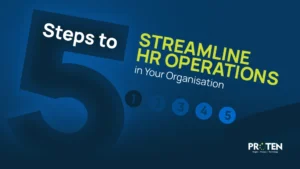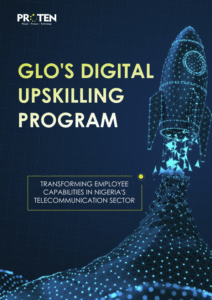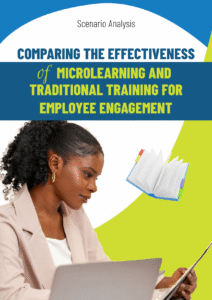One of the biggest mistakes you can make as an HR manager is failing to ask questions during your hiring process. And yes, we know. You’re the HR. You always ask questions. But how specific are they? Can they predict success? Another big mistake is failing to ask questions that are predictive of success. Questions that determine if your talent, or in this case, management consultant, is going to perform successfully for your company.
Being an HR Manager, you understand talent’s crucial role in an organization’s success. This extends beyond internal employees; external consultants can be invaluable assets for tackling specific challenges and driving strategic growth. However, with a management consulting industry projected to reach a staggering $266.9 billion by 2027, navigating your options can feel overwhelming. This exactly, is why you need to ask specific questions that will help you determine if your candidate is a high performer.
The key to a successful partnership with a management consultant lies in thorough due diligence. By asking the right questions upfront, you can ensure you’re selecting a consultant with the expertise, experience, and cultural fit to deliver optimal results. That’s why we’re sharing with you, 5 questions you should absolutely never avoid before hiring a management consultant.
Your Brain Teasers Are Futile
You read that right. Yes, we know every company and their trainee program is doing it. But because something is common doesn’t always mean it’s the right way. And let’s not lie, most companies give brain teasers just because other companies are doing it. We’re not saying you shouldn’t tell them to explain the colour green to a blind person (please don’t). But if you’re doing that and avoiding the initial purpose of your interview – to determine if your management consultant will be successful- then you’ve missed it.
Brain teasers often test for lateral thinking skills, which are just one aspect of problem-solving. They might not reveal a candidate’s ability to handle the specific challenges your company faces. In addition to this, management consultants need to be strategic thinkers. Brain teasers tend to be more tactical in nature and don’t necessarily assess a candidate’s ability to develop and implement long-term plans.
And let’s not forget that most business problems require an understanding of the specific industry. Brain teasers typically don’t assess a consultant’s knowledge of your company’s sector or its unique challenges.
Here’s What You Should Be Asking About
As mentioned before, your questions should be able to determine if the management consultant is going to be a high performer. And one way to do so is to have a basic understanding of what a manager consultant does. That way, you can understand why you should ask the questions we’re about to share with you below.
1. Industry Knowledge and Experience:
Why it Matters: A recent study by Bain & Company revealed that 70% of clients prioritize consultants with deep industry knowledge when making a selection decision.
Explanation: Management consulting is a broad field encompassing various sub-specialties. Selecting a consultant with a proven track record in your specific industry ensures they understand the nuances of your market, regulatory landscape, and competitor dynamics. This translates into tailored solutions that address your unique challenges and leverage industry best practices.
What to Ask:
- Can you provide examples of similar projects you’ve undertaken in our industry?
- How will your industry-specific knowledge benefit our specific goals?
- Do you have a dedicated team with expertise relevant to our sector?
Go Beyond the Pitch: Don’t settle for generic presentations. Request case studies detailing past projects in your industry, and inquire about the specific strategies and outcomes achieved.
2. Understanding Your Challenge: Defining Problems Before Solutions
Why it Matters: A study by McKinsey & Company suggests that 70% of transformations fail due to a lack of clearly defined objectives.
Explanation: The most valuable consultants are those who actively listen to understand your challenges before proposing solutions. They should possess strong analytical skills to assess your current situation, identify the root causes of problems, and define success metrics tailored to your specific goals.
What to Ask:
- How will you diagnose the root cause of our challenges before proposing solutions?
- What methodologies will you use to gather data and understand our current state?
- How will you define success metrics to ensure our project achieves its objectives?
Look for Active Listening: During the interview, observe the consultant’s approach. Do they ask clarifying questions, actively listen to your concerns, and demonstrate a genuine desire to understand your unique situation?
3. Project Approach and Methodology: Aligning Strategies with Execution
Why it Matters: A study by PricewaterhouseCoopers (PwC) revealed that 68% of clients prioritize a clear and well-defined project methodology when selecting a consultant.
Explanation: Beyond expertise, consultants should offer a transparent and structured methodology for approaching your project. This includes defining clear phases, communication protocols, and team collaboration strategies. A well-defined approach fosters transparency, minimizes surprises, and ensures the project stays on track.
What to Ask:
- Can you walk us through your project approach for addressing our specific challenge?
- How will you ensure clear communication and collaboration between your team and ours?
- What tools and resources will you leverage to streamline the project and track progress?
Request a Detailed Plan: Ask for a breakdown of the project timeline, outlining key deliverables, milestones, and communication protocols. Ensure the proposed methodology aligns with your internal processes and team structure.
4. Cultural Fit and Communication Style: Fostering Collaboration and Trust
Why it Matters: A study by Forbes Insights found that 72% of executives believe cultural fit is a crucial factor in determining the success of external partnerships.
Explanation: Management consultants will be working closely with your internal team. They must possess a communication style and work ethic that mesh well with your company culture. Look for consultants who are transparent, and collaborative, and demonstrate a genuine desire to integrate seamlessly with your team.
What to Ask:
- Can you describe your team’s communication style and preferred approach to collaboration?
- How will you ensure your team fosters a positive and respectful working relationship with ours?
- How will you handle disagreements and ensure open communication throughout the project?
Look for Shared Values: Beyond communication style, assess if the consultant’s values align with your company’s. This fosters trust and ensures everyone is working towards a shared vision.
5. Transparency in Fees and Deliverables: Managing Expectations and ROI
Why it Matters: A study by Hackett Group revealed that 40% of clients experience budget overruns when working with consultants.
Explanation: Clear communication about fees and deliverables is paramount. Understand the consultant’s fee structure (hourly, fixed fee, or performance-based), and ensure the proposed fees align with the project’s scope and industry standards.
What to Ask:
- Can you provide a detailed breakdown of your fees and expenses?
- What deliverables are included at each stage of the project?
- How will you track and report on project progress and ROI (Return on Investment)?
Negotiate a Fair Contract: Don’t hesitate to negotiate fees and engagement terms. Ensure the contract clearly outlines the scope of work, deliverables, timelines, payment schedule, and termination clauses.
In Conclusion…
Hiring a management consultant is a strategic decision. By meticulously evaluating their industry knowledge, project approach, cultural fit, and fee structure, you can select a partner who becomes a valuable asset in achieving your goals. Remember, the most successful consultant engagements are built on clear communication, mutual trust, and a shared vision for success. Taking the time to ask the right questions upfront ensures you get the best possible return on your investment, propelling your organization toward a brighter future.
Speaking of propelling your organization forward, we know that’s your end goal as an HR Manager. And one of the ways you can achieve that is by upskilling your employees. With our tailored training programs, you can equip yourself and your workforce with the skills needed to pivot your organization toward success. For more information, reach out to our learning and development experts. Or check out our thoughts about upskilling your workforce.










